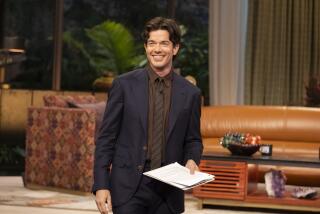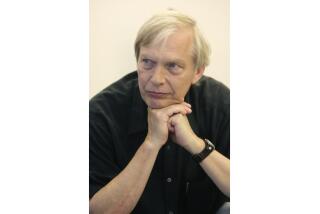Needling a Nation
- Share via
After his first foray into talk radio a decade ago, Larry Elder said, “I remember saying to myself what a god-awful waste of time that was.”
Since then, the host, who calls himself “the Sage from South-Central,” has changed his viewpoint, and now wants a portion of the rest of the country to spend three hours a day with him. He jumps to national syndication on Monday after eight years at KABC-AM (790), where he’s heard weekdays from 3 to 7 p.m.
“I feel like I’ve got a message that will resonate with the rest of the country,” a message whose pillars are personal accountability and reduced government, he says. Elder revels in his fans, “Elderados,” and rages against “victicrats,” those who “blame all ills, problems, concerns and unhappiness on others.”
A self-described social liberal and fiscal conservative, Elder and his libertarian views can enrage Democrats and Republicans, alternately.
He favors abortion rights and legalizing drugs. He also wants to end welfare and abolish the IRS, and calls affirmative action “morally bankrupt.”
“Hard work wins, and I think if you obsess over race, you’re doing a disservice to the country in general and to blacks in particular,” he said.
The Rev. Jesse Jackson, the Rev. Al Sharpton and Rep. Maxine Waters (D-Los Angeles) are frequent targets on his show, which includes repartee with callers, spoofs of news items, and commentary from Elder, who has a rapid-fire delivery and a lawyer’s facility for rhetoric and dissecting an argument.
“He’s very good at making a case, and being a black conservative makes him provocative,” said Michael Harrison, publisher of Talkers magazine, the trade publication for talk radio. “He can get away with saying things that would seem racist in a politically correct society if said by a white person.”
Like, “blacks are more racist than whites,” one of the tenets of Elder’s best-selling 2000 book, “The Ten Things You Can’t Say in America.” He also asserts that “there is no glass ceiling that stops hard-working, talented women from realizing their career goals,” that there’s “maybe a dime’s worth of difference” between Republicans and Democrats, and that the welfare state is “helping us to death.”
“I think I bring a certain kind of credibility and ‘inside baseball’ a white person couldn’t bring,” he said, but “most of the so-called black leaders would not be happy with my message.”
Yet as much as they decried his viewpoints, many civil rights leaders defended his right to speak in 1997 when a South-Central pressure group, the Talking Drum Community Forum, advocated a boycott of Elder’s program and its sponsors. The anonymous campaign sent fliers to advertisers and called Elder’s show “the most racist, anti-black program in America.”
*
Many sponsors pulled out, costing KABC an estimated $3 million in revenue. Denying that the boycott influenced the decision, the station cut Elder’s show from four hours to two, but reinstated his program to full length when robust ratings, a counter-protest by fans and a change in KABC management abated the furor.
Since he weathered that storm, observers don’t think he risks facing another such attack by a group elsewhere, even though he’s stepping onto a national stage.
“I don’t know what market you could put him in where he’d be more exposed than he’s ever been in Los Angeles,” said Al Peterson, news, talk and sports editor for the trade magazine Radio & Records. “Any talk host that doesn’t cause people to react in some way--positive or negative--isn’t doing his job.”
Elder will continue in his regular time slot at KABC, and starting Monday or soon after, will also be heard courtesy of ABC Radio Networks in Washington, D.C., Portland, Ore., Wilmington, N.C., Tampa, Fla., West Palm Beach, Fla., Port St. Lucie, Fla., Hartford/New Haven, Conn., and New London, Conn.
Apart from tweaking the opening of his program--”Buenas tardes, Los Angeles! The Court of Radio Free California is back in session!”--Elder said he expects to change his show very little for a national audience.
“Most of the issues in California have national import,” he said, such as bilingual education, Proposition 13, Proposition 187 and secession. And Hollywood is always good fodder.
Elder, 50, went from Crenshaw High School to Ivy League Brown University, then got his law degree from the University of Michigan. After working as a lawyer in Cleveland, he started his own company, an executive search firm placing attorneys.
He said that gave him the time to pursue an interest in writing, such as newspaper op-ed pieces, which led to a guest spot on a local radio show in 1992.
After that “waste of time,” a station executive who admired Elder’s passion asked him to fill in for one of his hosts on a week’s vacation.
Then-KABC host Dennis Prager, now on KRLA-AM (870), heard Elder and persuaded his bosses to give him a shot. In 1994, with a total of five days’ experience, Elder moved to Los Angeles and became a full-time talk radio host.
Elder said he exhibited his persuasive powers recently after a federal appeals court in San Francisco ruled that the Pledge of Allegiance was unconstitutional because of the phrase “under God.”
“I took the position that the plaintiff was right,” Elder said, although he added that if he was an atheist, “I can’t imagine it would be a big enough deal to me” to sue. But he maintained that the court’s decision was correct on constitutional grounds--a stance that infuriated many of his conservative listeners.
As he made his arguments, Elder said he was glad to hear some callers come around to his side.
“Calm down, listen to me, and maybe you’ll re-think your assumptions,” he said. “My goal is to provoke, inform, educate and entertain. And, from time to time, I like to think sometimes I can accomplish all four.”
*
NPR examines a changing California: The “New California” is the subject of a four-part series from National Public Radio that debuts this afternoon and runs through Monday on the newsmagazine “All Things Considered.”
The segments’ common theme is the state’s changing demographics, with the first report profiling a Latino entrepreneur in Los Angeles. Mexican immigrant Pedro Rivera worked his way through an underground economy to become owner of his own record company, an example that English is increasingly not a requirement for success in this majority-minority state.
Saturday’s installment looks at Asian activism in San Francisco, which arose when members of the ethnic community making up 30% of the city’s population felt their children were being denied access to the best public schools.
On Sunday, reporter Ina Jaffe looks at the convergence of immigration and organized labor, which in Los Angeles alone has added 120,000 new union members in the past three years.
Finally, Monday’s segment looks at reverse migration--a trend shown in the 2000 census of many California residents and newcomers abandoning the dream of coastal living. Instead, commuters seeking affordable homes and retirees fleeing city congestion are flocking inland, to the Central Valley and elsewhere.
*
“All Things Considered” airs weekdays from 3 to 6:30 p.m. on KPCC-FM (89.3), and from 4 to 7 p.m. on KCRW-FM (89.9). “Weekend All Things Considered” is heard Saturdays and Sundays on KPCC and KCRW from 5 to 6 p.m.
More to Read
Sign up for Essential California
The most important California stories and recommendations in your inbox every morning.
You may occasionally receive promotional content from the Los Angeles Times.









